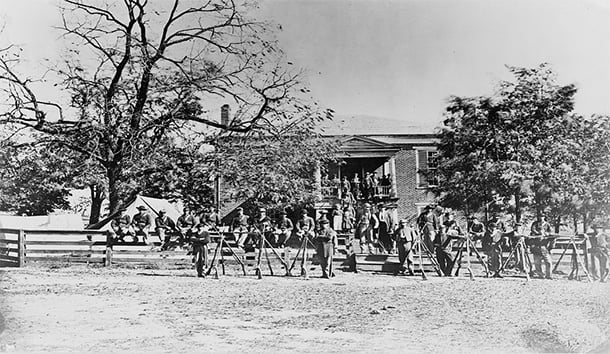This year marks the 150th anniversary of Appomattox. In recent times, academics studying the Civil War have reached a striking degree of consensus about how that war should be understood, and its practical implications today. Sadly, that consensus has one enormous omission.
Overwhelmingly, scholars agree that the war was about the defense and preservation of slavery, so that any and all rival interpretations—such as states’ rights or conflicts over the tariff—are dismissed as diversions. This was no mere War Between the States, but a naked struggle between good against evil. If that’s true, that is a potent statement for today’s politics of commemoration. States and cities will come under enormous and increasing pressure to remove any memories of soldiers or politicians who fought only for such unspeakable oppression. Who can defend the defenders of slavery?
So absolute has this view become that the most visible historians openly mock any rival theories. You believe in the states’ rights argument, they ask? Then name just one states’ rights issue unrelated to slavery that sparked the war. And explain, please, if it believed so passionately in local rights, why the Confederacy became such an aggressively centralized and interventionist state, far more so than the North? In reality, the war began and ended as a conflict over slavery. Only an issue as explosive as slavery could have fueled passions fiery enough to provoke a war that killed 750,000. Or so we are told.
Slavery, obviously, marked the critical dividing line in the war, and without that conflict, war would never have come. But was it the only issue? We might turn the states’ rights question on its head. Was slavery the central issue for the North in 1861? Clearly not. Lincoln’s administration strove desperately to avoid any sense that the federal government was fighting an abolitionist war, because they knew that any war framed in those terms could never command a majority of Northern opinion.
If the Union had indeed been fighting explicitly to end slavery, it would never have had an army. Only very gingerly, after the war had been in progress for a year or two, did the administration bring abolition onto center stage, and even then, it was framed in terms of pragmatic military necessity.
When we read contemporary statements about the war, North and South, there is one theme, one idea, that inflames both sides in 1861, and that is honor. Lacking any sense of the underlying ideology, later historians skim over such rhetoric as empty verbiage, but in so doing, they miss the heart of the story.
For 19th-century Americans, honor was the critical value underlying civilized society, and honor was the most cherished possession of a person, a family, or a community. Honor was intimately linked to good reputation, which must be defended at all costs, and violence easily erupted in a society deeply sensitive to personal slights. Concepts of honor absolutely shaped the proper behavior expected of both sexes.
The American obsession with honor and shame, insult and retaliation, fascinated and horrified European visitors, and it is a centerpiece of Charles Dickens’ American Notes (1842). Defense of honor and family drove the country’s many duels and personal feuds and vendettas, some of which amounted to minor wars.
I recently lost a dear friend, a fine historian named Bill Pencak, who more or less denied the existence of the Civil War. That sounds like revisionism run amok, until you realize his tongue-in-cheek intent. What he argued, provocatively, was that America between (say) 1835 and 1875 was rife with endemic local wars and conflicts, night-riding and massacre, marked by urban riots and lynchings, by acts of mass vigilantism and community justice, by the mass murder of minorities and ethnic outsiders. This occurred to an extent inconceivable in contemporary Europe. Moreover, that was true in all sections of the nation.
As a matter of convenience, said Bill Pencak, we happen to take the four bloodiest years of this ongoing carnage and label them “the Civil War.” Those years differed in severity from what went on before or since, but not in kind.
So, what happened in 1860 and 1861? The South saw in Lincoln’s Republicans a massive threat to its survival, but also to the honor and reputation of its states, cities, and families. Only armed force could correct the insult. Northerners enlisted in the thousands to avenge the insult to the national flag at Fort Sumter, and the violation of national honor. Both sides really did think they were fighting to defend their family and their womenfolk, for hearth and home. And the war of serial honor killing and vendetta only escalated from that point.
Historians fail to understand this because America’s world of honor and shame is no more. It is part of a dream forgotten, a civilization gone with the wind.

Leave a Reply